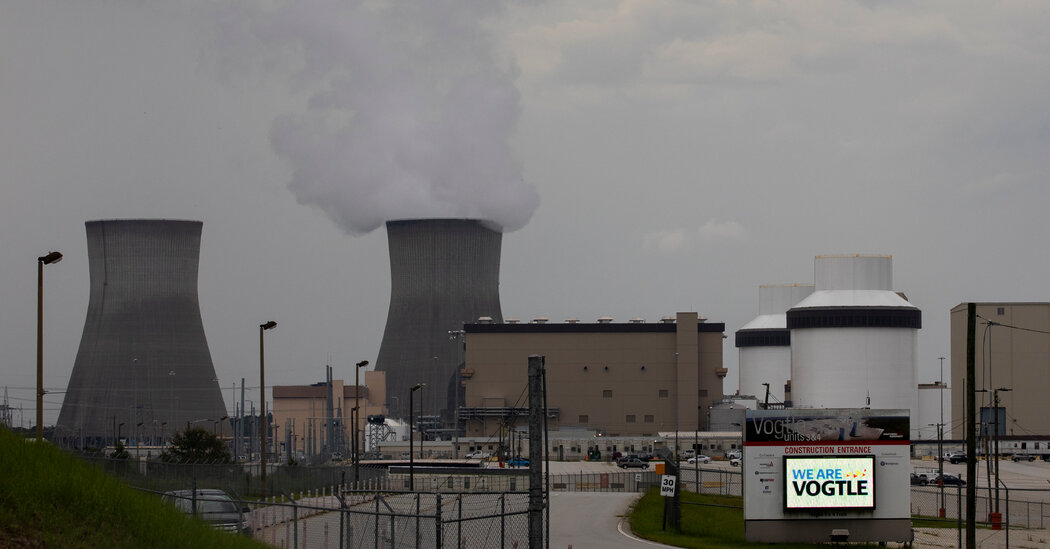- cross-posted to:
- nyt_gift_articles
- climate@slrpnk.net
- cross-posted to:
- nyt_gift_articles
- climate@slrpnk.net
Measures moving through Congress to encourage new reactors are receiving broad bipartisan support, as lawmakers embrace a once-contentious technology.
The House this week overwhelmingly passed legislation meant to speed up the development of a new generation of nuclear power plants, the latest sign that a once-contentious source of energy is now attracting broad political support in Washington.
The 365-to-36 vote on Wednesday reflected the bipartisan nature of the bill, known as the Atomic Energy Advancement Act. It received backing from Democrats who support nuclear power because it does not emit greenhouse gases and can generate electricity 24 hours a day to supplement solar and wind power. It also received support from Republicans who have downplayed the risks of climate change but who say that nuclear power could bolster the nation’s economy and energy security.
“It’s been fascinating to see how bipartisan advanced nuclear power has become,” said Joshua Freed, who leads the climate and energy program at Third Way, a center-left think tank. “This is not an issue where there’s some big partisan or ideological divide.”
Holy shit that’s big
deleted by creator
Very much necessary, wind and solar can only do so much. I just hope the nuclear power industry doesn’t fuck it up this time.
They didn’t fuck it up the first time, actually. Big oil smeared the industry into oblivion
Chernobyl and Three Mile Island didn’t help, but yes.
I take it everyone’s pretending Fukushima didn’t happen as well.
Chernobyl is irrelevant and three mile island killed no one and released no non negligible radiation into The environment. They buried the reactor but thatt’s about it. More people have died falling off of roofs installing solar panels this year than have died in.nuclear accidents this decade
Chernobyl and Three Mile aren’t irrelevant, because the public perception is that they aren’t irrelevant.
See also: crime goes down, people vote as if crime is going up.
This would have been great 30 years ago. Don’t get me wrong, I’m glad they’re doing it. But we’re already fucked at this point.
Typical, the republicans only got on board because they think there will be a payday in it for them.
FINALLY
I feel like fusion will be scalable before a new nuclear plant in the US sends a single kWh into the grid.
I mean we just opened a new nuclear plant here in Georgia.
All I can think about with that title is that’s not what inertia means…
Why not?
Objects at rest will stay at rest.
No credit for partial answers. The second half of that law is - objects in motion will stay in motion unless acted upon by an outside force.
Inertia exists in both motion and stillness. It is a state of matter that doesn’t change. It just is. Saying “decades of inertia” means nothing.
Different definition. This is one that says something like “of or relating to the characteristic of being inert.”
I’m disappointed in all of you.
Why me?
It’s the same definition. Things that are not moving tend to continue to not move unless acted on by an outside force.
inertia noun in·er·tia i-ˈnər-shə
1a: a property of matter by which it remains at rest or in uniform motion in the same straight line unless acted upon by some external force
1b: an analogous property of other physical quantities (such as electricity)
2: indisposition to motion, exertion, or change : inertness
It’s the second one.
About damn time
We also ought to take a second stab at doing nuclear-powered merchant shipping to get rid of the incredibly polluting bunker oil cargo ships use. After all, NS Savannah’s nuclear propulsion worked just fine; it only “failed” because of its weird, uneconomic half cargo/half passenger layout and anti-nuclear paranoia getting it banned from ports.
Lets see if the tech is still relevant in 20 years once its ready. Other energy sources are getting cheaper, as well as storages. And nuclear power is slow due to high safety requirements.
Maybe I am wrong and they don’t need 20 years to build a nuclear power plant and I would celebrate this as a win for the planet – but I highly doubt nuclear will play any significant role in the transition to green energy.
Nuclear is still the best we have to provide green energy that can meet the rising energy demands worldwide. At least until fusion tech is figured out, but that’s more like 50 years.
How so? Renewables produce electricity at a much cheaper rate. Meeting rising energy demands is easier with cheaper production.
Solar has had impressive growth, but the land use needed to actually meet all electrical demand is a lot. Solar still needs a backup solution, battery tech to solve this doesn’t exist and any realistic cost estimate is on par with nuclear.
It’s going to take decades to build enough panels anyway, so we might as well build some nuclear anyway. It significantly reduces the amount of solar needed.
Solar has had impressive growth, but the land use needed to actually meet all electrical demand is a lot.
You don’t have to dedicate the land solely to solar. There are many places where it can improve the environment/efficiency through dual use, e.g. parking lots or even fields with animals. Many places also have more than enough space to dedicate to it. I don’t see this as a real problem.
Solar still needs a backup solution, battery tech to solve this doesn’t exist and any realistic cost estimate is on par with nuclear.
Nuclear also needs a backup solution (e.g. due to summer heat or maintenance). Battery tech has improved massively over the last years, and grid-level storage is being deployed as we speak. A new nuclear plant doesn’t have to compete against current batteries - it has to compete against the batteries we’ll have built by the time the reactor is finished. Even if the cost estimates right now are on par with nuclear, they won’t be in a couple of years.
It’s going to take decades to build enough panels anyway, so we might as well build some nuclear anyway.
Solar (and other renewables) are much faster to deploy than nuclear reactors are. In the same time, and with the same resources you’ve spent on a reactor, you could have built multiple times the generation capacity in renewables.
It significantly reduces the amount of solar needed.
Sure, as does any other power source. But we should go for the cheapest and quickest solutions - and nuclear fission isn’t, and will most likely never be, either of those.
The DoE just approved the first new reactor designs to be approved in decades, so while the permitting and construction will take a while, there will be new plants coming online. Six are already approved.
https://www.nrc.gov/reactors/new-reactors/large-lwr/col/new-reactor-map.html
Which is good – but it will take at least 20 years until they operate. And the US doesnt need 6 – they need 600. And until 2050, so in 26 years. Too little, too late, too slow.
Fair point.







